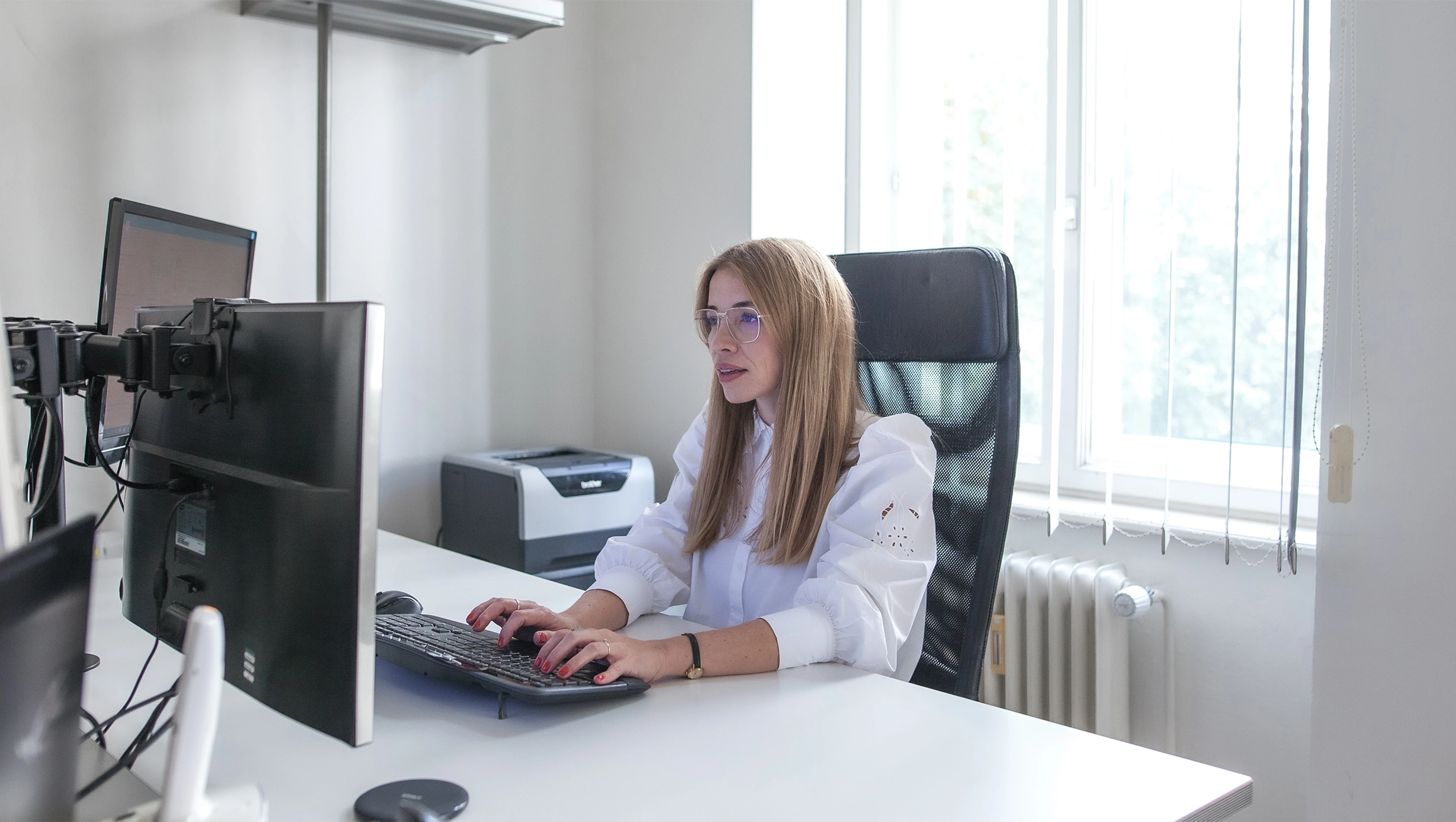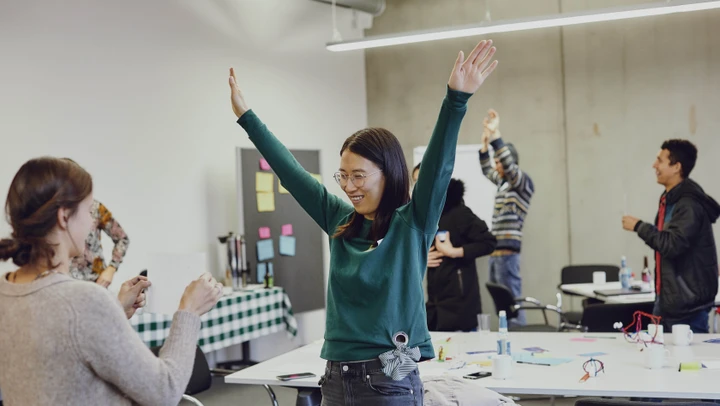 © Copyright: Julia Davin
© Copyright: Julia DavinJulia Davin is an engineer specialized in AI and co-founder of the Munich-based AI company Masterplan Engineering. Together with her husband Alexandre, she offers customized software solutions and consulting in almost all artificial intelligence fields. In 2020, they were host entrepreneurs to Virginie Bezot, who worked at Masterplan Engineering for six months as part of the Erasmus for Young Entrepreneurs program. In the interview, Julia talks about her own experiences as a founder and as the host entrepreneur of the Erasmus for Young Entrepreneurs.
Julia, please tell us more about yourself and your entrepreneurial background
After my Abitur I first studied business administration. As I always had a passion for mathematics and technology, I decided to do a technical second degree and become an engineer.
Together with my (later) husband Alexandre, I founded Masterplan Engineering, a tech company at the end of 2017 that specializes in the implementation of AI-based software. In the beginning we offered project-based AI implementation. In mid 2019 we started to develop a ready-to-use predictive maintenance technology, which has been used in companies for the first time in early 2020.
How did you identify this market niche and what motivates you?
For me, the identification of the market niche AI was more emotional than rational: During my Master's degree I have read a chapter about neural networks in a script about IT system architectures. I was incredibly fascinated by the idea of recreating the human brain, "the firing of synapses" with mathematical models. I can say that it has been the first time in my school or university education that a topic fascinated me so much that it did not let me go. From that point on it was clear to me that I wanted to work in the AI field. Then, later on, I was lucky that AI was on everyone's lips and from then on was considered a technology of the future.
The reason why I started my own company is that it allows me to implement my creative solution strategies, even if they are crazy. So nobody can slow me down in the search for solutions, only I can slow myself down. I have gladly accepted the entrepreneurial risk in order to have the freedom of combining my creativity with mathematical logic.
How did you prepare for your start-up journey? What is the tool set you had to pack in your start-up bag to accomplish your goals?
I have not prepared myself concretely. I actually became gradually an entrepreneur. I come from an entrepreneurial family, which means that even as a child I understood what being an entrepreneur means. Additionally, I already worked as a freelancer during my studies.
The knowledge toolset I profited from was the skills I gained during my business studies. Here I learned all the important things about business law, accounting, taxes, marketing and controlling. My technical knowledge enabled me to develop machine learning and AI algorithms.
My mental toolset consisted of a good portion of willingness to take risks and enthusiasm about my work. I burn for artificial intelligence and love to acquire new knowledge.
Basically, my toolset has been constantly expanding since 2017, I am learning a lot and I am open to continuously expand my toolbox.
What special challenges did you face as a female entrepreneur compared to your male colleagues?
At the moment I don't see any particular challenge in being a female entrepreneur. But I can remember situations where it was not the case. In my technical studies I certainly had the feeling that fellow students or tutors didn't take me seriously. I have experienced discrimination from men who felt in competition with me.
Today it's different, in my daily work I have many meetings with customers and industry partners. We work with machine manufacturers and manufacturing companies; in these meetings I'm basically the only woman and usually 20 or 30 years younger than my counterparts. Here I have never had the feeling that I am not taken seriously. On the contrary, I feel very respected in meetings about technical matters. Nevertheless, I would be very happy to work with more women.
Your research has been published in a book recently. Can you tell us what your chapter is about?
My research was published in an edited volume entitled "Artificial Intelligence and Digital Education in Germany". A topic that is currently very present and important.
My research and my chapter "The morality of machines - Can neural networks learn ethical principles?” shows the difficulty that a machine faces when it tries to pick up people's moral from their environment and rank it on ethicality scale.
I think the topic of machine morality is very crucial for the next few years. I hope that research will intensively address this question. It is a question that has to be dealt with under consideration of many factors like technical feasibility, philosophy and ethics. Since machines increasingly make decisions and these decisions are also morally coloured, the need for a moral driven AI arises.
The question is also, which moral guidelines do we impose to a machine? Field test have shown that usually human behaviour differs from ethical principles. The key question is here: on which ethical basis should we train an ethical AI?
Which advice would you give to an aspiring founder?
There are two things I would advise a young entrepreneur to do: Stay inquisitive and never give up!
As an entrepreneur, you face new challenges almost every day. You are immersed in topics you are not yet familiar with. This is a great opportunity to learn a lot of new things. To be able to gain the required knowledge, you have to remain curious and open. Don’t be afraid to leave your comfort zone.
Entrepreneurial success stories like Mark Zuckerberg and Facebook are often in people's heads. People tend to think that you simply have to have a good idea to become a multimillionaire. However, the gap between the good idea and a solid business model is usually not so glamorous, it is hard work. And there will be times where you will be wrong. Therefore, here is my advice: learn from the difficult phases and move on. That makes you grow and strengthens you as entrepreneur.
Last year you were part of the Erasmus for Young Entrepreneurs program as a Host Entrepreneur. What was your benefit from this exchange?
I am very pleased that we can participate in the Erasmus program for Young Entrepreneurs. We are very pleased to have gained a new perspective on our ventures. When you work on specific technical details of a product for a long time, you tend to look at the market with technical glasses. A perspective from outside can only be enriching. As German-French founders, we see ourselves as a European company and are therefore pleased to have international competences in our team.
Together we analysed the French market, carried out a market study and defined strategic goals. In addition, we have already been able to get in contact with very interesting French leads.
Personally, I am very pleased having met such a committed entrepreneur from France and having developed new ideas together with her.
Thank you for the interview!
About Masterplan Engineering:
Because each project requires very specific skills, Masterplan Engineering work closely with top European universities and put teams together with the right expertise for their clientele's particular challenges and provide support from the initial design to the final turn-key solution.
You'd like to read more success stories of female founders? Here is our interview with Virginie Bezot!






